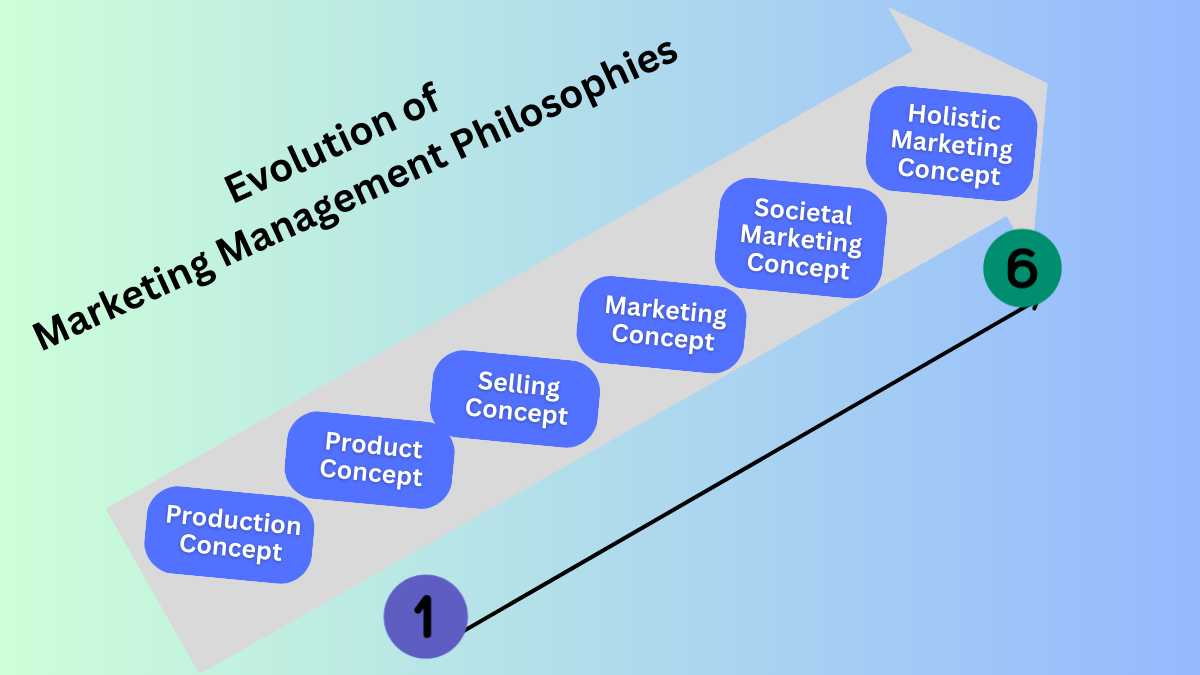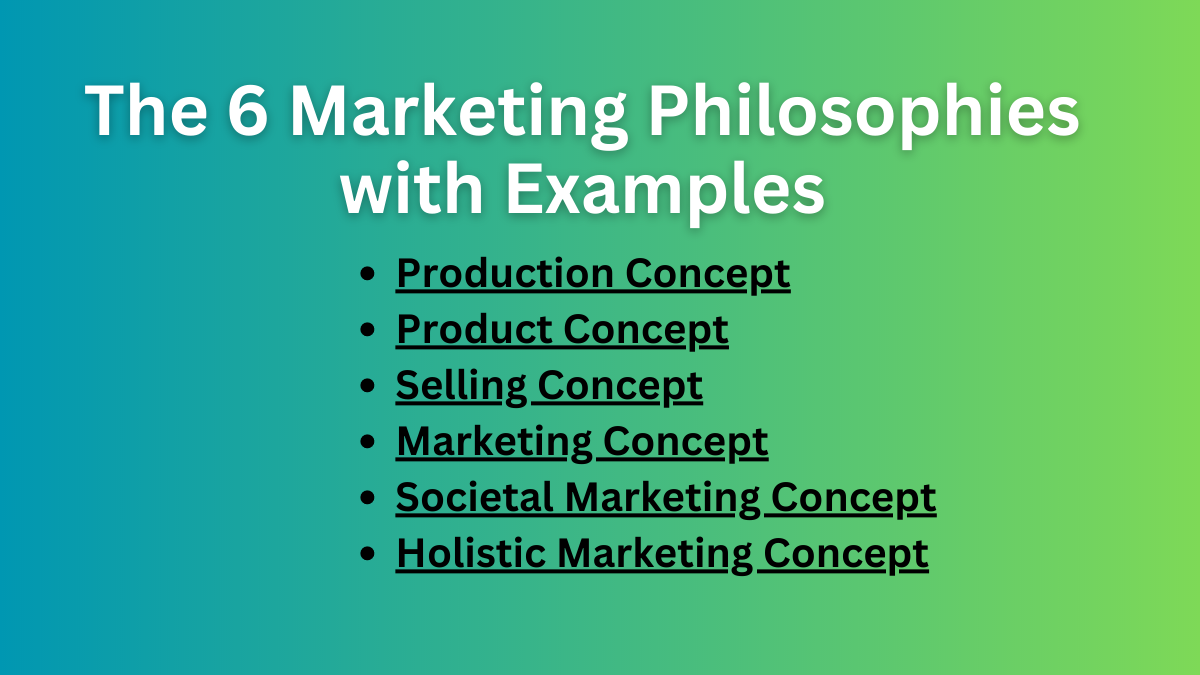What is a Marketing Philosophy?
Marketing philosophy is a fundamental strategy that directs a company’s actions toward customers and goals. It’s a mindset guiding how a company engages with customers and achieves its objectives.
This approach emphasizes different factors, such as product quality, aggressive selling, customer needs understanding, or a comprehensive perspective considering all elements. Different marketing philosophies have evolved, each philosophy shapes how a company creates, communicates, and delivers its products or services to meet customer demands profitably.
These philosophies evolve with time and changing priorities. Some focus on efficient production and affordability, while others prioritize product excellence or aggressive selling tactics. The marketing philosophy that a company adopts impacts its entire approach to business and influences various departments beyond just marketing.
The philosophy of marketing is the driving force behind how products are designed, how promotions are planned, and how customer relationships are nurtured.
Evolution of Marketing Philosophies
The marketing philosophies are also called marketing management philosophies or marketing concepts. Since the civilization of humans, the concepts of marketing started to evolve. Since then, six concepts of marketing have evolved they are pictured below.

From them, the production concept of marketing is the first or earliest marketing concept, whereas, the holistic marketing concept is the latest addition to marketing philosophies.
The 6 Marketing Concepts with Examples: Defining
So far we understood, the six marketing concepts have evolved so far, let’s understand each marketing philosophy in detail with examples.
Production Concept
The production concept of marketing centers on offering products that are easily accessible and cost-effective. Businesses adopting this philosophy aim to maximize profits by producing goods in large quantities, benefiting from economies of scale. This approach originated during the Industrial Revolution to meet high demands. By enhancing production efficiency, companies can provide goods at lower prices, attracting consumers.
This concept emphasizes mass production and affordability, often relevant where cost reduction and high demand are key. For instance, countries like China and India leverage mass production for cost-effective products.
While the production concept boosts affordability and job creation, it may compromise product quality and neglect customer preferences. Moreover, it could lead to environmental concerns and hinder innovation. Examples include China’s manufacturing sector, India’s IT services, and fast fashion pioneers like Zara and H&M.
Related: 8 Pros and 7 Cons of Production Concept of Marketing
Emerging during the 20th century, the production concept remains relevant today, especially in scenarios where cost efficiency and widespread availability are crucial for success.
Product Concept
The product concept in marketing focus on crafting products that boast top-tier quality, performance, and features. This approach compels businesses to cater effectively to customer desires, emphasizing excellence as the key driver.
Rooted in the 1930s and lasting through modern strategies, the product concept emerged alongside the production concept, shifting focus to creating superior-quality goods. It asserts that customers prioritize quality and are willing to pay more for better products, stimulating continuous innovation and improvement.
The product concept advocates innovation, uniqueness, and a customer-centric outlook. It highlights that superior product attributes, paired with strategic marketing and distribution, lead to market success. However, it might overlook customer preferences beyond product attributes.
Related: 8 Pros and 7 Cons of Product Concept of Marketing
Examples like Apple, Gucci, Sony, and Mercedes-Benz embody the product concept by consistently delivering high-quality, innovative offerings that cater to specific customer segments. While its historical roots remain strong, adapting this concept to evolving market demands ensures enduring relevance.
Selling Concept
The selling concept of marketing lies in the notion that customers won’t naturally buy a company’s products, necessitating strong promotional and sales efforts. Emerging post-World War II, it prevailed until the mid-20th century. This approach heavily relies on persuading potential buyers to convert latent needs into purchases through assertive techniques.
Distinctive traits include promotion-driven strategies, short-term orientation, and a focus on products rather than customer needs. It’s fitting for unsought goods, motivating swift sales. The selling concept functions through four principles: establishment of a factory, emphasis on seller-selected products, aggressive promotion, and maximizing profit via high sales volume.
Pros encompass heightened sales focus, inventory management benefits, market expansion, immediate revenue generation, and amplified product awareness. However, it tends to disregard customer needs, prioritizes short-term goals, and might lead to misguided assumptions.
Related: 8 Pros and 7 Cons of Selling Concept of Marketing
Examples encompass insurance companies, luxury fashion brands, vacuum cleaner sales, and political campaigns. While still relevant in scenarios requiring push-based promotions, the selling concept must be balanced with customer-centric approaches for sustained success.
Marketing Concept
The marketing concept is a strategic philosophy that prioritizes creating products tailored to meet the needs of customers. It emerged around the 1950s, signaling a shift from production-centered approaches. This concept revolves around understanding customer desires deeply and crafting offerings that cater to them effectively.
Characterized by a customer-centric approach, the marketing concept involves thorough market research, customer satisfaction as a priority, long-term perspective, and integrated marketing efforts. It embodies principles like target market focus, customer needs fulfillment, integrated marketing, and organizational goal achievement.
Operating through four key principles, the marketing concept starts with identifying the target market, focusing on customer needs, employing integrated marketing strategies, and ultimately achieving profits through customer satisfaction.
Related: 8 Pros and 7 Cons of Marketing Concept
Advantages include enhanced relevance, resource efficiency, stronger relationships, and a competitive edge. However, challenges encompass a narrow focus, research intensity, susceptibility to market shifts, and customization complexities.
Examples of the marketing concept in action include Apple’s iPhone line, Coca-Cola’s personalized bottles with names, and Nike’s customizable shoes. In today’s dynamic business landscape, the marketing concept remains a cornerstone of successful strategies, guiding companies to prioritize customers’ evolving needs for sustainable growth.
Societal Marketing Concept
The Societal Marketing Concept, introduced by Philip Kotler in the 1970s, advocates aligning marketing decisions with consumer desires, company needs, and long-term societal welfare. It goes beyond profit-driven approaches, emphasizing sustainable practices and ethical considerations.
This concept balances customer satisfaction, business goals, and societal well-being, promoting harmony between these factors. It prioritizes ethical actions, long-term vision, and positive impacts on society.
Starting with identifying target social groups, focusing on social needs, utilizing socially acceptable marketing tools, and aiming for profit through societal well-being, the concept promotes a triple-win scenario: benefits for society, customers, and the company.
Related: 8 Pros and 7 Cons of Societal Marketing Concept
Societal Marketing Concept’s three pillars are society (human welfare), customer (satisfaction), and company (profit). By fostering responsible profits, fostering customer loyalty, and enhancing public image, it offers advantages. However, challenges include higher costs and complexity in balancing factors.
Examples of companies applying the Societal Marketing Concept include The Body Shop’s eco-friendly products, Adidas’ recycled plastic shoes, Coca-Cola’s inclusive advertising, and Airbnb’s #WeAccept campaign. This concept remains relevant in today’s socially conscious landscape, where businesses aim to contribute positively to society while fulfilling consumer needs.
Holistic Marketing Concept
The Holistic Marketing Concept considers a business as an interconnected entity, integrating departments like sales, operations, and customer service to work collaboratively toward a shared goal. Emerging in the early 2000s, it emphasizes synergy and cohesion across the organization for enhanced customer experiences and brand strength.
Holistic marketing promotes a unified brand message, a customer-centric approach, and ethical considerations. It recognizes that every aspect of a business contributes to its success, similar to the interdependence of the human body’s components.
Related: 8 Pros and 7 Cons of Holistic Marketing Concept
This approach prioritizes internal marketing, integrated marketing, relationship marketing, and socially responsible marketing. Advantages include unity of effort, strong branding, and ethical reputation. However, complexities in coordination and potential conflicts can be drawbacks, particularly for smaller businesses.
Examples of holistic marketing in practice include Coca-Cola’s emotional connection, Apple’s seamless integration, Starbucks’ personalized service, Patagonia’s ethical practices, and Nordstrom’s customer-centric approach.
In today’s dynamic business landscape, where consumer expectations and ethical considerations are significant, the holistic marketing concept remains relevant for organizations seeking comprehensive success.
Related: The 4 Principles of Holistic Marketing Concept
Which Marketing Philosophy is Best and Why?
Among the six marketing concepts – Production, Product, Selling, Marketing, Societal, and Holistic – the best one depends on the business’s goals and the current world.
The production focuses on making lots but might not consider customer needs. The product emphasizes quality, but if customers don’t want it, it won’t succeed. Selling pushes products, but it might not care about what customers want.
Marketing understands customers and makes things they want. Societal cares about society and ethics, which can improve the brand. Holistic sees the business as a team, working together for success.
The “best” concept considers customers, society, and the company’s goals, like marketing, societal, or holistic. Today, as people care more about ethics and relationships, the Societal and Holistic concepts shine by considering everyone – customers, the community, and the business.
So, the best philosophy is the one that blends marketing understanding, ethical responsibility, and unified teamwork.
Arti Kushmi holds a BBS (Bachelor in Business Studies) degree and shares her business and marketing knowledge through this website. While not writing she will be reading and enjoying the moment.
